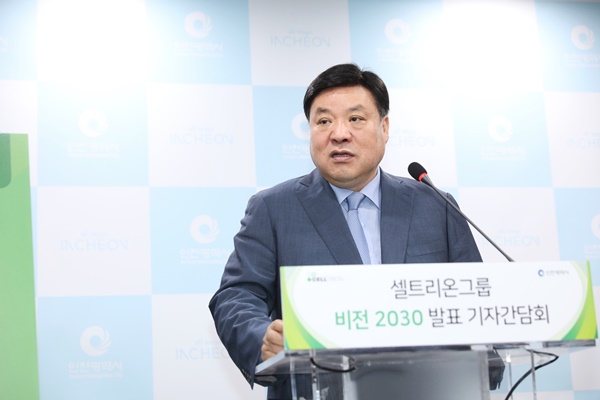Seo pledges massive investment ‘to nurture biotech sector before retirement’
“It’s been 19 years since I started this business. The first decade was a time of hardship. I only hope that junior people can become successful without going through too much trouble as I did. I hope other companies will join our effort to lead innovation in the biotech industry. I will do the best I can to lay the ground for the next generation before I retire.”
Celltrion founder and CEO Seo Jung-jin made the remarks during a news conference at the company in Songdo, Incheon, on Thursday, announcing a plan to invest 40 trillion won ($33.6 billion) in the bio and healthcare sector by 2030.

Planning retirement in 2020, Seo seemed committed to working not only for Celltrion but for the entire local biotech industry to make them globally competitive.
Always a step faster than others to challenge, Seo has been drawing both anticipation and suspicion. When the word “biosimilar” was rarely known, he started developing it and heard some people calling him a fraud. In the end, Seo pulled off a surprise success to develop the world’s first antibody biosimilar Remsima and shook off all the suspicions. His company went beyond the domestic market and entered the European and U.S. markets to raise sales rapidly.
At a news conference in January, Celltrion announced that it would establish a direct sales network in foreign markets. It was the first Korean biopharmaceutical firm to do so. Analysts said building an overseas distribution channel would be demanding because local drugs hardly played in the global market.
Celltrion’s move was to secure profitability in an industry where biosimilars were in stiff competition globally.
Seo vowed to finish setting up the direct sales networks in Canada by 2021 and in the U.S., Asia, and Europe by 2025, brushing off concerns of naysayers. Celltrion Healthcare won direct biddings in major Asian countries, including Singapore and Thailand. In Europe, the company’s plan of establishing local units in 14 countries is going as scheduled.
Celltrion has been able to challenge things with seemingly low possibility “because Seo has got the guts,” observers said.
For Seo, walking on the road not taken was “a time of hardship,” he said.
During the press conference on Thursday, Seo repeatedly emphasized Celltrion’s corporate social responsibility as a market leader, for the future of the company and the Korean biotech industry.
The 40 trillion won investment scheme focuses on constructing a “bio valley” centering on Incheon not only to enhance Celltrion’s competitiveness but to seek the entire bio healthcare industry’s advancement together. Another biosimilar maker Samsung BioLogics is also headquartered in Songdo, Incheon.
“If we combine Celltrion and Samsung BioLogics, Songdo will have a bigger biosimilar production capacity than Genentech, which has the world’s largest production facilities. As Korea will become the largest buyer, we will boldly invite foreign companies into Korea,” Seo said. “By supporting collaborations between companies and the local government, we will help make ‘a bio ecology under a virtuous structure.’”
His ambition also includes reinforcing support for new venture firms by enlarging the 200 billion won fund, jointly operated with Mirae Asset Group, to 500 billion by 2025, and 2 trillion won by 2030.
Seo called for other leading firms to participate in the plan.
He said that the Korean economic crisis came from a crisis in the industries.
“The government could play a catalyst role to overcome this crisis, but it cannot be the problem solver,” he said. “Starting from me, I promise the investment in the bio sector. Other leaders in the biotech sector could make similar announcements so that the public can pin hope for our industry.”

